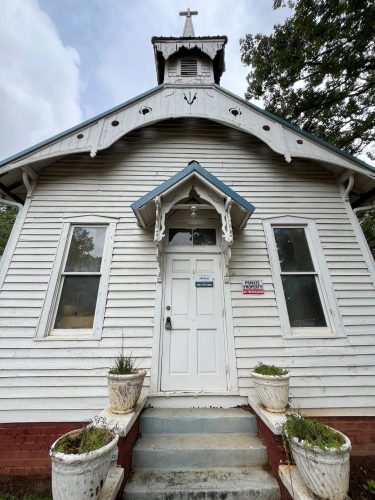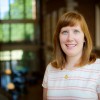This week’s blog post comes courtesy of the 2024 Medford Fellow, Kayla Cavenaugh. I’ll let Kayla introduce herself and her work…
Hi! My name is Kayla Cavenaugh, and I have been serving as the Medford Archives Fellow here in Special Collections and Archives (SCA) this summer. I am about to embark on my second year as a graduate student at UNC Chapel Hill, where I am earning an MS in Library Science. Serving as the Medford Archives Fellow during the midpoint of my studies has been an invaluable learning opportunity in preparation for my career as an archivist interested in photography and facilitating access to visual information.
As the Medford Archives Fellow, I was tasked with providing order to the Houck Medford Papers, a manuscript collection that includes prints of analog and born-digital photographs, digital images and videos, handbound artists’ books, and self-published booklets. A selection of images are available online in SCA’s Digital Collections. Houck Medford, the creator of this collection, is a documentary photographer based in Blowing Rock, N.C., who has spent the past two decades documenting his vision of the Blue Ridge Mountains. Houck began donating his work to SCA in 2021 and established an endowment that funds experiential learning opportunities. I am following in the footsteps of Tsing Liu, class of 2023, who served as the Medford Curatorial Associate during her senior year at Wake.
Houck began his career as a dentist, opening a private practice in 1989 in a converted garage located on Reynolda Road between Buena Vista and Robinhood Roads – a building familiar today to Winston-Salem residents with a sweet tooth as Bobby Boy Bakeshop. During the 1990s, he shifted his focus away from dentistry toward conservation and philanthropy, founding the Blue Ridge Parkway Foundation in 1997, and eventually leaving the organization in 2010 as CEO Emeritus and Founder. It was during his tenure at the Blue Ridge Parkway Foundation that he developed interests in photography, filmmaking, and book arts as a way to document his viewpoint of the regional culture and natural surroundings of the Blue Ridge Mountains.
The prospect of working with this collection was doubly interesting to me: Not only would I gain experience in facilitating archival access to photographic images, but I would also get the opportunity to work with a living artist. So often, our work as archivists is speculative, rooted in imagining what was going through a record creator’s head. Most archivists I know are skilled at critical, empathetic thinking because we frequently put ourselves in the shoes of people who are no longer living, based on the fragmentary evidence that we have of a life lived. It is rare in the archives world to have the luxury to email the creator of a collection and ask for clarification, for their input, to simply say hello.
An archivist’s work often boils down to “making sense” of a collection. Houck’s work includes multiple versions and format iterations of a single documentary project, ranging from photographic materials, to films, to books. Because Houck’s creative process is so wide-ranging, I knew from the start it would be a challenge to contextualize and make sense of his work. Throughout the process, I strove to be an ethical steward and I found myself repeating an old Girl Scout motto: “Leave it better than you found it.” For instance, in writing the finding aid, it was important to me to highlight KB Medford’s role in supporting and helping carry to fruition her husband’s artistic endeavors. Additionally, in writing descriptive metadata for digital images, I sought to balance: being true to Houck’s voice as an artist while offering contextual information as needed.
A highlight of the summer was accompanying Houck, KB, and SCA director Tanya Zanish-Belcher to visit Tucker’s Grove Camp Meeting Ground in Lincoln County, N.C., where a community of six predominantly Black African Methodist Episcopal church congregations gather every summer. Houck and KB have been helping tell the stories of community members’ remembrances of camp meetings of the past; they are currently in the process of publishing a forthcoming book in 2025. We visited a few of the six church buildings, and while we stood beneath old oaks in gravel parking lots and churchyards, and later found shade beneath the arbor of Tucker’s Grove, it was fascinating to hear from Houck and KB, both white, about their positionality as outsiders and how they are navigating the complexities and challenges of sharing their work back to church community members. To me, the work of a future Medford Archives Fellow would include further contextualizing Houck’s involvement with the Tucker’s Grove community.

Because my term lasted from late May to mid-August, I honed my project management skills this summer in creating and executing a processing plan for this collection. The key to my success, however, was that the ZSR SCA team took me under their wings and helped me feel confident to learn new tools and skills, whether it was navigating donor relations, learning to use Adobe Bridge scripts, formatting metadata spreadsheets, or publishing an inventory and finding aid on ArchivesSpace. Additionally, one-on-one meetings with the directors of each library unit, as well as multiple all-staff gatherings, allowed me to form a more coherent picture of how academic library professionals of all walks of life work together toward common goals.
Some of my favorite moments this summer involved stepping away from work, such as taking a field trip across town to visit colleagues at the Moravian Archives for the Southern Province, enjoying coffee with mentors and colleagues, having deep conversations about the nature of archival description, and discovering the magic of letterpress for the first time. It was a joy to collaborate with the ZSR SCA team, and I’m thankful that they helped me slow down and be intentional about embedding myself in an academic library environment, a place to which I would be happy to return someday.
Thank you, Kayla! Your help making the Houck Medford Papers, especially the physical and digital images, more accessible was essential.

5 Comments on ‘Medford Fellowship 2024: Creating Access to the Houck Medford Papers’
Kayla this is so awesome!! It’s really cool to hear about Medford’s many projects, your work on the collection, and your overall experience this summer! We’re lucky to have had you 🙂
Thank you so much, Kayla! We have enjoyed hosting you and I am glad you found the experience to be professionally worthwhile.
Kayla Cavanaugh was a gift from heaven.
The Medford Collection is a newly endowed collection at Wake Forest—the first of its kind to support a growing photographic collection and book arts of a still-living and producing artist. This is new ground for all because it is a first. Kayla’s unique ability was organizing a body of knowledge and expansive content into a unified plan for moving forward.
Thank you, Kayla!
Houck and K.B. Medford
Houck and KB are two of the finest people I have ever known, and they bring to this work the same brilliant stewardship they bring to the earth. I think their work is one of the most enduring legacies in our time
Thank you both and to the zsr library for recognizing their genius emily
I enjoyed this post, Kayla. Your Medford Papers finding aid is so informative and the organization really intuitive. Amazing work. Hope your fall semester is going well!